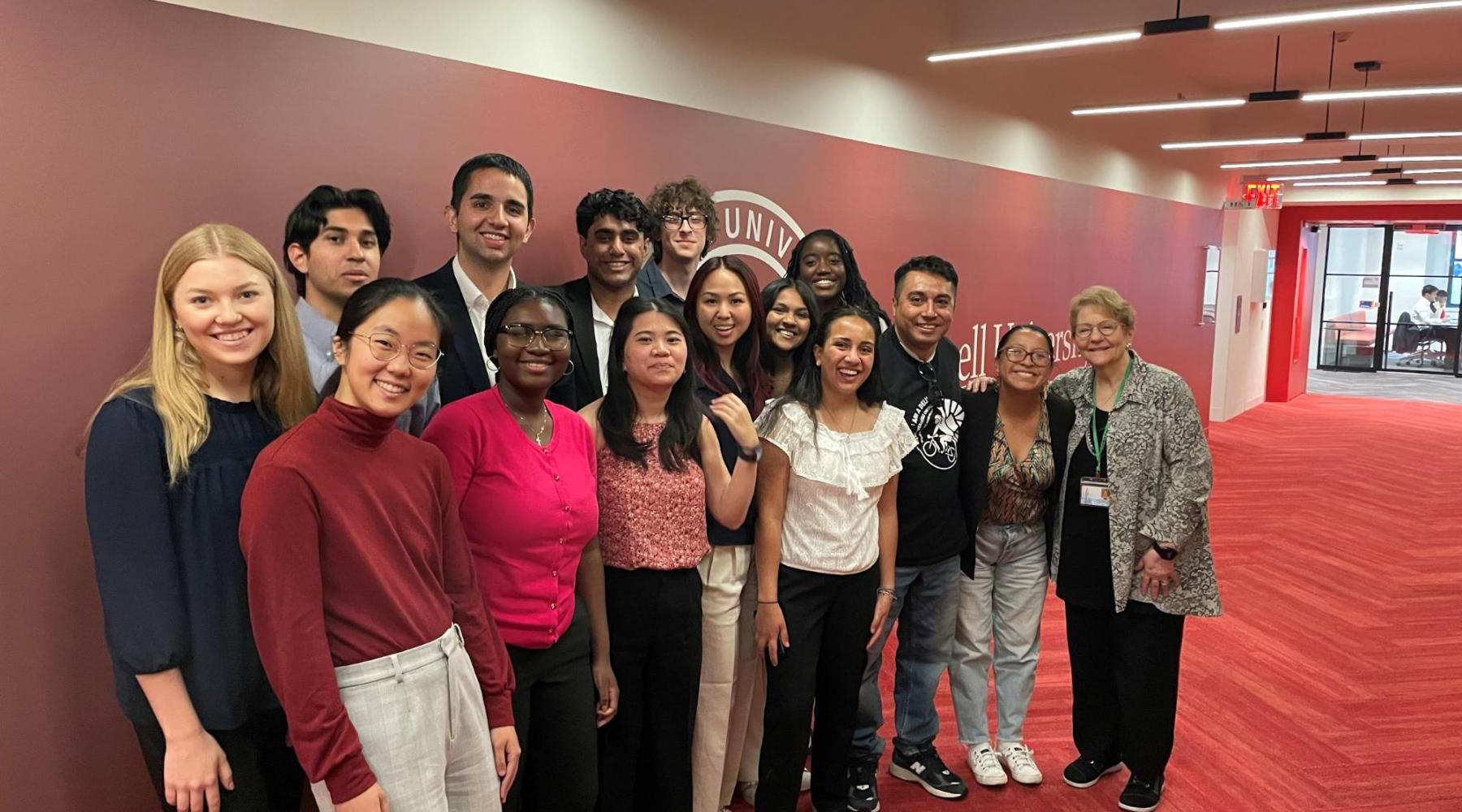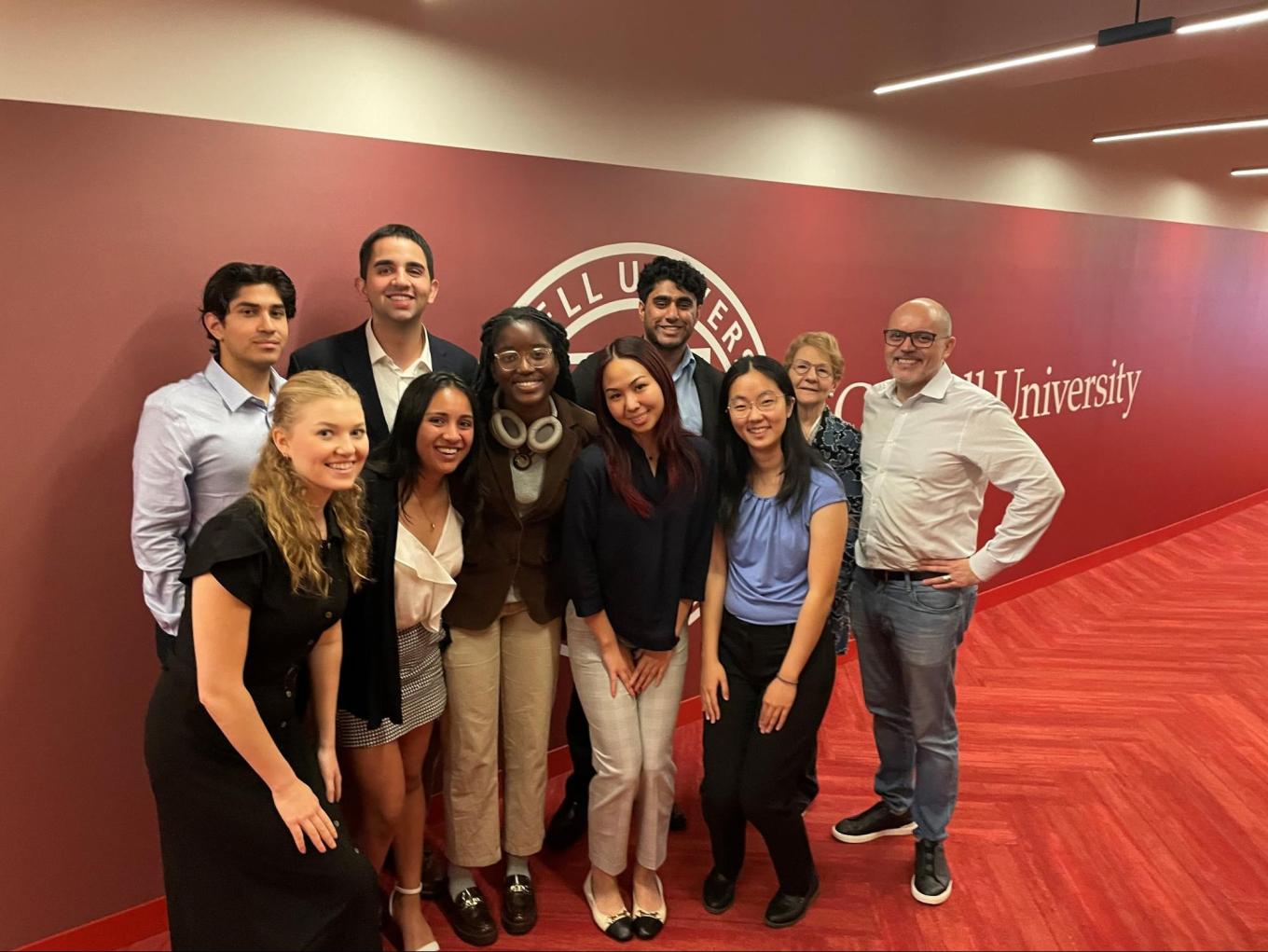
Guest Speakers Deliver Engaging Dialogue with High Road Fellows in NYC
“What can I do to help?” asked Tover Feist (‘26). Well, technically he asked “qué puedo hacer para ayudar?”
The question arrived at the end of the second week of the NYC High Road Fellowship during a sit down with Ligia Guallpa and Antonio Solis of Los Deliveristas Unidos, a group working toward giving app delivery workers access to basic labor rights.
Fresh off a landmark minimum wage victory for app-based food delivery workers in New York City, Guallpa, executive director for the Workers Justice Project (WJP), and Solis, leader with Los Deliveristas Unidos, met with the 12 High Road Fellows to discuss their fight.
Listening to Solis’ account of the poor treatment and unsafe working conditions of delivery workers, Feist, a New York City native, recalled the early days of the COVID-19 quarantine. He remembered how it was Los Deliveristas who kept the city moving during the pandemic. For Feist, quarantine and the impact of the pandemic on marginalized workers “was a motivating phase that made me want to go to ILR.”
This summer, Feist will report to the NYC Mayor’s Office on Climate Change “working on a program to design green jobs in New York City. I thought that was a worthwhile cause.”
Another question arrived. Mateo Franco-Aguirre ‘24 asked how Guallpa and Solis were able to force the hands of large corporations, something he, himself, wants to do in his future career as a lawyer. “I always knew I wanted to be a lawyer, so I looked at each school. 'What school has the best outcome of getting students into law school?' ILR. It was such a simple decision for me,” said Franco-Aguirre.
The rising senior is working at Local 338 RWDSU/UFCW (a rather lengthy acronym that always conjures a chuckle from the fellows). Franco-Aguirre is eager to cut his teeth reviewing Labor Peace Agreements for Local 338. He revels in diving into the deep end. “Every law class I've taken [at ILR] I've absolutely loved. Even if I'm crying. I don't cry… but with how difficult the concepts are, I just really enjoy it,” said Franco-Aguirre.
Franco-Aguirre asked the same question – “how do you force their hand?” – a week later to Dr. Teofilo Reyes, chief program officer at Restaurant Opportunities Centers United (ROC).
Founded after September 11, 2001 by restaurant workers displaced from the World Trade Center, ROC is a worker’s center focused on building worker power. ROC and Dr. Reyes have fought endlessly to advocate a thriving wage, end harassment in the restaurant industry, enact fair scheduling practices, resolve occupational segregation, provide child care to restaurant employees, and ensure sufficient employment benefits.

The fellows’ conversation with Dr. Reyes was full of kitchen confidentials: wage theft, $2.13 minimum wage for tipped workers, broken policy, poor working conditions, dine-and-dashes taken out of the waitstaff’s paycheck.
Injustices big and small. Little fires in each corner of the country from sticky midwestern diner tables to city sous-chefs; Ron Varghese ‘25 found the scale of the fight daunting. “It felt like ROC wasn’t able to always fight for a victory. More like [ROC] was trying to not lose too much ground…” Yemisi Mustapha ‘25 recalled similarities in her own experience working at a fast food restaurant when she was 17, “standing in the Arizona summer heat for four hours, taking orders on an iPad.”
Contrasting the two weeks’ speakers, the fellows reflected on fighting at local and national levels. Los Deliveristas Unidos were fighting the few but mighty food-delivery corporations in New York and claimed some victories as well as some defeats. ROC United were fighting not just in New York, but all across the country, a vast web of mom and pop restaurants, food chains, and everything in between.
“It seemed really daunting. There wasn’t as clear a path forward,” said Mustapha.
But the stoicism of Dr. Reyes prevailed. In the face of immense opposition, what has kept him going “is the victories we have achieved. We’ve won major campaigns at restaurant groups here in New York and other cities. We stopped Andrew Puzder from becoming secretary of labor…we were able to stop [the National Restaurant Association’s] efforts to take away people’s tips, and we got the minimum wage increased.”
Despite Dr. Reyes’ stoicism and unwavering assuredness, one question stumped him: Why do you do what you do? There was a reason there, but it was hard to put into words. And did the ‘why’ really matter when the fight was so much bigger than himself? For Dr. Reyes, it was never a matter of doing anything other than helping people, than fighting for justice.
As the High Road Fellowship pressed on into the summer months, each guest speaker seemed to carry this innate and masked motivation for their work: there was never a thought of not helping people. It is a trait shared by the fellows. Whether they want to become arbitrators, advocates, activists, or anything in between, each fellow shares this deeply woven desire to fight a good fight.